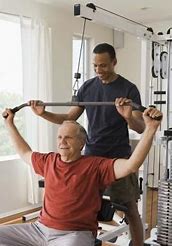Oct 31, 2022 1:18:35 PM
3 Reasons why Exercise is Medicine
by the BODiWORKS Institute team

What if there was a way to prevent, or even treat, some of those health issues we are told about?
You have probably heard about the importance of exercise, but have you ever stopped to think about the potential of exercise to be a form of medicine?
Over the last several years research has proven that exercise is both a viable and effective form of medicine. In many cases exercise can be just as effective (if not more sometimes) a treatment as medications, without the negative side effects.
Two important factors to remember about “exercise” however: It mainly helps if it is sustained (regular) and prescriptive (for you specifically).
There are many chronic health conditions that can both be prevented and treated through exercise. Here are three:
- According to the World Health Organization (WHO), the first year of the COVID-19 pandemic resulted in a 25% increase in anxiety and depression rates worldwide! While the mechanisms behind depression are not yet fully understood, decreased levels of the neurotransmitter serotonin have been linked to depression, which is why selective serotonin reuptake inhibitors (SSRIs) are a popular form of treatment for depression. However, SSRIs are only 20% more effective than placebo treatments (National Library of Medicine, 2020). In addition, they often come with an extensive list of side effects including, nausea, vomiting and weight gain (National Library of Medicine, 2020). Fortunately, exercise has proven to be an effective form of treatment for depression. Netz’s 2017 review of the literature concluded that exercise was an effective form of treatment for depression, either as a stand-alone treatment or in addition to antidepressants.
- Type 2 diabetes is caused by increased blood sugar levels which cause increased insulin levels and eventually lead to insulin resistance. According to Diabetes Canada, exercise can work just as well as medications in controlling Type 2 diabetes. It is also noted as an effective way to prevent developing diabetes in the first place. In some cases, with regular exercise Type 2 diabetes can be reversed.

Managing conditions such as diabetes and hypertension are even more important as it relates to the aging process in our brains. Some researchers have begun to refer to Alzheimer’s Disease as Type 3 diabetes due to the apparent link between these metabolic conditions. While the link between the two is not yet fully understood, what we do know is that increased blood sugar and insulin levels can upset the balance of our brain biochemistry leading to deterioration. Further, individuals with diabetes are more likely to have conditions such as heart disease or stroke which can further damage the brain by way of compromised blood vessels. Like with Type 2 diabetes, exercise has been shown to be an effective treatment to delay the progression of Alzheimer’s disease, as well as reduce the risk of developing Alzheimer’s disease in the first place by as much as 50% (Alzheimer’s Research and Prevention Foundation)
3. Osteoporosis is a disease in which the bone becomes more porous leading to an increased likelihood of fractures.
More than just walking - Specific weight bearing exercises are required to help stress and strengthen the bones, causing them to remodel and get stronger. In fact, Osteoporosis Canada recommends regular exercise to all individuals with osteoporosis, including those who have had previous spinal or hip fractures. Through exercise  bone loss can be slowed, as well as increased strength and balance reduce the risk of future falls.
bone loss can be slowed, as well as increased strength and balance reduce the risk of future falls.
The good news is our bodies are very adaptive! It is never too late to start exercising and working towards better health. The key is to get help, start small and stick with it! Here at Bodiworks we have programs to help all individuals reach there health goals. Our RENEW program, is specifically targeted to adults aged 40 and older, and provides one on one exercise counselling to help meet your goals, no matter what your health concerns are.
References:
https://www.ncbi.nlm.nih.gov/pmc/articles/PMC5430071/
https://www.cdc.gov/diabetes/basics/type2.html
https://www.diabetes.ca/managing-my-diabetes/tools---resources/physical-activity
https://behavioroptions.com/the-connection-between-physical-activity-and-behavior/
https://osteoporosis.ca/exercise/
https://www.alz.org/media/Documents/alzheimers-dementia-diabetes-cognitive-decline-ts.pdf
https://alzheimersprevention.org/4-pillars-of-prevention/exercise-and-brain-aerobics/